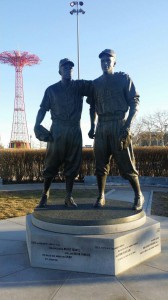When Hollywood tells you a movie is “based on a true story,” that means you’re about to eat popcorn while watching lies. The Jackie Robinson movie,”42,” begins with those words on the screen. OK, I buy in. I know nuance runs second to amped-up drama in big-budget movies. Still, let’s talk about one scene.
During a game in Cincinnati, when Robinson is the target of racist harangues from the box seats, Pee Wee Reese walks across the infield grass. He walks slowly. The music suggests suspense. Reese walks from shortstop to first base. There he hangs an arm over Robinson’s shoulders. They chat, the white man from Kentucky and the black man born in Georgia. Reese is smiling, laughing. Robinson’s face shows confusion slowly reshaping itself into contentment. The music rises to let us know This Is The Drama, Folks.
What a moment.
Long before the movie, people raised money to immortalize the moment in bronze. At Brooklyn’s minor league ballpark, a heroic statue shows Reese with his arm over Robinson’s shoulders.
The moment was brave, caring, even sweet.
Except, most likely, it never happened.
Whatever happened, maybe it happened in Cincinnati, maybe in Boston. It could have happened anywhere in the late 1940s when Jim Crow laws and customs divided Americans. In “42,” it happens at Cincinnati’s Crosley Field in 1947. Reese, portrayed as a Southern innocent, if not a yokel, complains to the Dodgers’ boss, Branch Rickey, about a letter threatening him if he plays alongside Robinson. Rickey trumps that single letter with hundreds addressed to Robinson. Thus instructed, Reese realizes the burden that Robinson has carried alone through that season. So, hearing the Crosley Field racists, Reese crosses the infield to Robinson. The crowd is rendered silent.
It happened in Atlanta in 1947. A letter had come to Robinson with a promise that the Ku Klux Klan would kill him if he showed up in that city’s Ponce de Leon Park. That night, as the Dodgers warmed up, Robinson and Reese threw alongside each other. Reese looked at Robinson and said, “Damn, Jackie, get the hell away from me, will you? The guy might be a bad shot.”
They laughed and went on warming up.
That would make a nice statue, too.
This picture was taken at the Brooklyn ball field, KeySpan Park in Coney Island of Jackie Robinson and Pee Wee Reese of the Brooklyn Dodgers, who were honored for breaking the long-held racial barrier in the major leagues during the 1940’s. I think this is a very powerful and strong message, and also serves as a reminder of how far we have come.
http://www.nytimes.com/2005/11/02/sports/baseball/02robinson.html?_r=0




